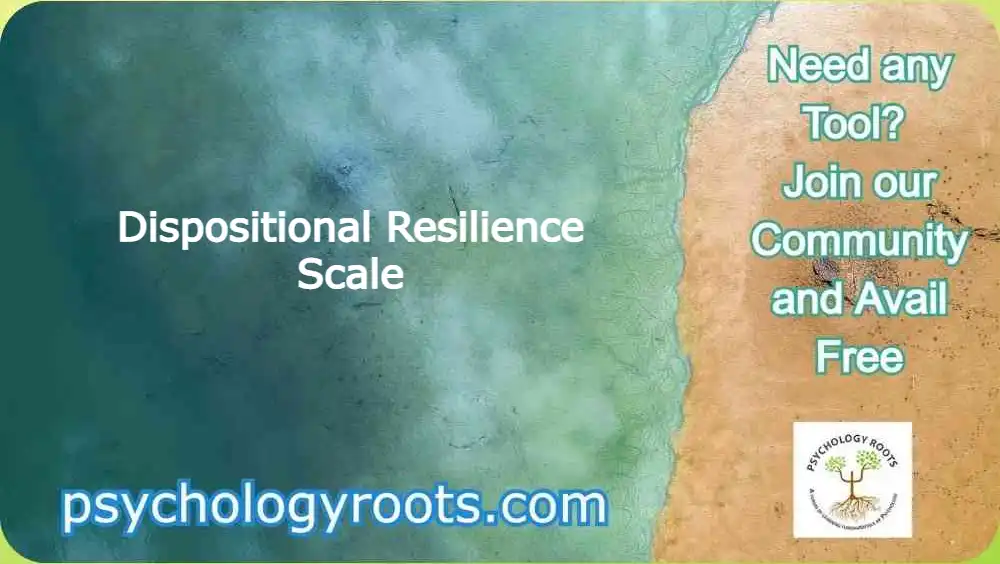Table of Contents
Dispositional Resilience Scale (Hardiness)
Here in this post, we are sharing the “Dispositional Resilience Scale (Hardiness)”. You can read psychometric and Author information. We have thousands of Scales and questionnaires in our collection (See Scales and Questionnaires). You can demand us any scale and questionnaires related to psychology through our community, and we will provide you with a short time. Keep visiting Psychology Roots.
About Dispositional Resilience Scale (Hardiness)
Scale Name
Dispositional Resilience Scale (Hardiness)
Author Details
Bartone, P. T., Ursano, R. J., Wright, K. M., and Ingraham, L. H.
Translation Availability
English

Background/Description
The Dispositional Resilience Scale (DRS), developed by Bartone and colleagues in 1989, is a 45-item self-report tool designed to assess an individual’s level of resilience or psychological hardiness. Hardiness, a personality trait associated with stress resistance, comprises three core dimensions: commitment, control, and challenge. These dimensions reflect an individual’s ability to view life events as meaningful (commitment), influence outcomes (control), and see change as an opportunity for growth (challenge).
Respondents rate items on a 4-point Likert scale, where 0 indicates “not at all true” and 3 represents “completely true.” Both positive and negative items are included, with lower total scores indicating higher levels of hardiness. The scale’s balanced design ensures it captures an individual’s disposition across diverse life contexts, making it a versatile tool for resilience research.
Administration, Scoring and Interpretation
- Obtain the Copy: Published in psychological and military health journals; requests can be directed to the original authors or relevant databases.
- Purpose: To measure dispositional resilience or psychological hardiness.
- Instructions: Respondents rate 45 statements based on how true they feel these statements are in relation to their own experiences.
- Time: Approximately 10–15 minutes to complete.
Reliability and Validity
The Dispositional Resilience Scale demonstrates strong psychometric properties. The total scale has a high internal consistency (α = .85), with subscale reliabilities ranging from .62 to .82. These metrics reflect its reliability in measuring commitment, control, and challenge dimensions. The DRS has been validated in diverse populations, including military personnel and healthcare workers, proving its utility in stress and resilience research.
Available Versions
45-Items
Reference
Bartone, P. T., Ursano, R. J., Wright, K. M., & Ingraham, L. H. (1989). The impact of a military air disaster on the health of assistance workers: A prospective study. The Journal of nervous and mental disease, 177(6), 317-328.
Important Link
Scale File:
Frequently Asked Questions
What does the DRS measure?
It measures psychological hardiness through three dimensions: commitment, control, and challenge.
Who can use the scale?
It is widely used in clinical, organizational, and military research settings.
What is the scoring system?
Scores are calculated based on participant ratings, with lower total scores indicating higher hardiness.
Is the DRS suitable for non-clinical populations?
Yes, it is applicable to both clinical and non-clinical populations.
What are some applications of the DRS?
It is commonly used to assess resilience in high-stress professions and to evaluate the effectiveness of stress management interventions.
Disclaimer
Please note that Psychology Roots does not have the right to grant permission for the use of any psychological scales or assessments listed on its website. To use any scale or assessment, you must obtain permission directly from the author or translator of the tool. Psychology Roots provides information about various tools and their administration procedures, but it is your responsibility to obtain proper permissions before using any scale or assessment. If you need further information about an author’s contact details, please submit a query to the Psychology Roots team.
Help Us Improve This Article
Have you discovered an inaccuracy? We put out great effort to give accurate and scientifically trustworthy information to our readers. Please notify us if you discover any typographical or grammatical errors.
Make a comment. We acknowledge and appreciate your efforts.
Share With Us
If you have any scale or any material related to psychology kindly share it with us at psychologyroots@gmail.com. We help others on behalf of you.